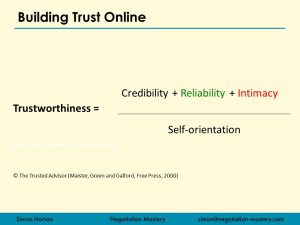Remote negotiations fail more frequently than face-to-face ones and even if they reach an outcome, it is likely to be a sub-optimal outcome. This is what the research shows and with home-working the thing these days, it’s something we really need to address if we want to get good results from our negotiations and our collaborations.
And probably the single biggest reason why email negotiations fail is because building trust and relationship, both essential parts of negotiation, are much harder to do remotely.
THE TRUSTED ADVISOR
The simple fact is we build trust by proximity – if we have met someone once, we are likely to trust them more. If we have met them twice, we are likely to trust them even more still. Email just doesn’t cut it when it comes to trust. So how can we build trust online?
Well, let’s start by looking at how we do it in any business relationship. This is the Trust Equation and it comes from the book, The Trusted Advisor (by Maister, Green & Galford). which was a ground-breaking book when it came out and it showed the importance of trust in any commercial or professional relationship.
So Maister, Green and Galford say that trustworthiness is equal to credibility plus reliability plus intimacy divided by self-orientation. Now you’re not so interested in your own trustworthiness, obviously you trust yourself; your issue is increasing their trustworthiness. And there isn’t much you can do to control their credibility, their reliability, their intimacy or their self-orientation. Especially online.
But actually there is. You can increase their trustworthiness by increasing your own.
You cannot trust your counterparty if they can’t trust you. So, if you want to trust them, which you do, then you have to be trustable first.
Which means we have to look at this equation from our own perspective – increasing our own credibility, our own reliability and our own intimacy and decreasing our own self-orientation.
So what are these terms in practice? Maister, Green and Galford say:
Credibility is about knowing your stuff, knowing their stuff. What is the quality of the work you do? How much experience do you have in this field?
Reliability is about what will you actually deliver? Will you deliver as you say you do, will you send them the link that you promised, are you on time for the conference call, do you reply to your emails? All of these are tiny little communications about whether they can rely on you or not. If you say you’re going to do something, can they rely on you doing that thing? And you want to build up that reputation that yes they can, you are reliable.
Intimacy: this is about emotions. It is about feeling safe talking about difficult things. It’s about making ourselves human, relating to them as a human, sharing personal information. It is about proximity. The more points of contact you have with them, the greater the trust you’re building. And physical is better so make sure you use the blended approach we discussed in another presentation and get to meet your counterparty in person when you can.
And then lastly, self-orientation: are we purely caring about ourselves or are we also thinking about them? We need to show we understand their goals and talk about achieving their goals. Be fair. Use independent benchmarks in order to remove the subjectivity. Pre-empt their concerns. If you say things like, “Listen, I know you’re worried about x” or “I know you’re trying to achieve y”, they will know that you are genuinely thinking about their outcomes and so they can trust you more.
And because they can trust you more, this means you can trust them more.
So all of these are things we should be doing anyway but the more our negotiations are conducted online, the more we need to be doing them actively as part of our communications with the other person.
BUILDING RELATIONSHIP ONLINE
So trust is critical to the negotiation and so is relationship. But we build relationship better face to face, too, because it is easier to use humour or ask that casual question about their weekend and this kind of thing.
So how do we do it online? Again, we need to consider the things we would do face-to-face and then take much more care over them when negotiating remotely.
One way is to match their style. You have probably come across the idea of matching body language as a way of building rapport but it’s not just body language, you can even do this via email. For example, if they are a blunt type of emailer and they write very short emails, they do this because they think it’s important. So if you do the same, they will think, “Yes, this person’s got it”. Conversely, if they are a very warm emailer or they’re a very verbose emailer or whatever their style, match it because they think that it’s important. Now, on the other hand, if you think their email style is problematic, then you might want to nudge it towards a better communication style. You will have to take a call on this.
Use non-task chatting about personal things. Even on email it’s sometimes worth bringing in a less formal element to the conversation: about the weekend or about their favourite football team or whatever it might be.
Connect on LinkedIn. The more you know about the other person, the more connection you can build with them which will make it easier to build trust. Connecting on LinkedIn means they can see your profile and you can see theirs and you can get to know each other a little better and maybe find some past connection.
Now consider the idea of in-group/out-group. Human beings are tribal beings and, in terms of persuading and trust, it’s much easier if you are in-group compared to if you are out-group. The good news is that human beings are so rich in who we are as a person that there is always an overlap to be had, and your job is to find that overlap between who they are as person and who you are as a person. Maybe you are both from London or maybe you’re both lawyers or you’re both parents; there is always an overlap to be had. In fact, the deepest connection is making it simply human to human. If you can make this connection, it will help build the relationship and trust massively and make a better deal.
Of course, this isn’t email specific but it’s such an important part of trust and relationship that it’s worth putting a little emphasis on it, tactfully of course, we don’t want to over-egg it.
Don’t use negative words in your emails or judgemental words, there is no quicker way to lose the rapport.
And in your email, refer positively to the relationship; for example, “Oh, thanks very much for your flexibility on this issue” or “We’re making a lot of progress here”. And along similar lines refer to the progress made. Summarizing the progress made on a regular basis can be a useful way to keep the collaborative nature continuing, even (perhaps especially) when you meet a deadlock.
And lastly, if you think things are going wrong, you can always communicate about the communication. This is something called meta-communication and it’s a very powerful process which can change the whole quality of the relationship. For example, if they have been a little blunt in their communication, with you or with other people, you can call them on that and ask them to soften their language. Often they’re not aware how they come across and communicating about the communication can move it to a better way of working.
CONCLUSION
Negotiations have moved more and more online in recent years but the research has shown that online negotiations are not as successful as face-to-face and are much more likely to fail.
The main reason for that is how important it is to build trust and relationship and yet how difficult it is to do so online. Follow the guidelines above and you will go a long way to getting better outcomes in your collaborations and your negotiations and you won’t have to leave your home to do it!




